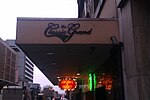Glasgow Central railway station

Glasgow Central (Scottish Gaelic: Glaschu Mheadhain) is one of two principal mainline rail terminals in Glasgow, Scotland. The railway station was opened by the Caledonian Railway on 1 August 1879 and is one of 20 managed by Network Rail. It is the northern terminus of the West Coast Main Line (397 miles (640 km) north of London Euston). As well as being Glasgow's principal inter-city terminus for services to England, Central also serves the southern suburbs of the Greater Glasgow conurbation, as well as the Ayrshire and Clyde coasts. The other main station in Glasgow is Glasgow Queen Street. With just under 33 million passengers in 2017–18, Glasgow Central is the twelfth-busiest railway station in Britain and the busiest in Scotland. According to Network Rail, over 38 million people use it annually, 80% of whom are passengers. The station is protected as a category A listed building.In Britain's 100 Best Railway Stations by Simon Jenkins, the station was one of only ten to be awarded five stars. In 2017, the station received a customer satisfaction score of 95.2%, the highest in the UK.
Excerpt from the Wikipedia article Glasgow Central railway station (License: CC BY-SA 3.0, Authors, Images).Glasgow Central railway station
Argyle Street, Glasgow Blythswood Holm
Geographical coordinates (GPS) Address Nearby Places Show on map
Geographical coordinates (GPS)
| Latitude | Longitude |
|---|---|
| N 55.858 ° | E -4.258 ° |
Address
Hielanman's Umbrella
Argyle Street
G2 8DL Glasgow, Blythswood Holm
Scotland, United Kingdom
Open on Google Maps








